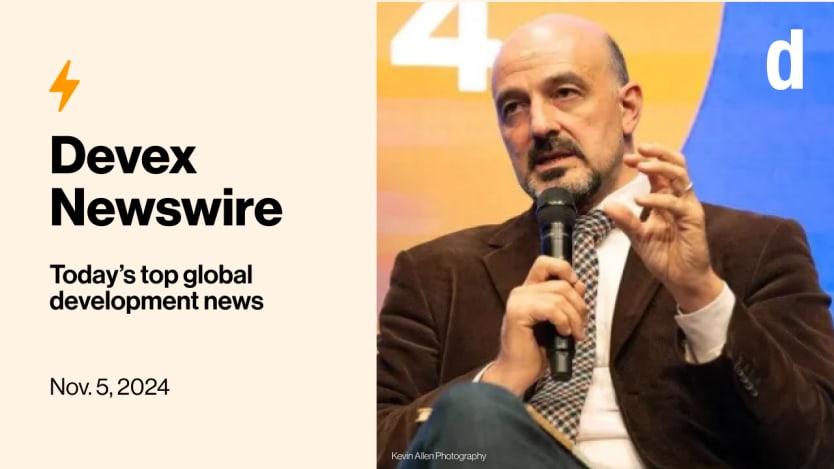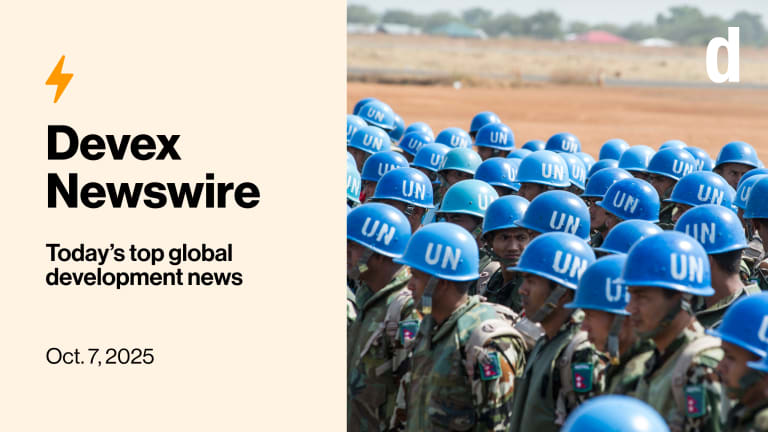
Can’t we all just get along? In today’s polarized world, the question sounds almost trite. But one organization has been tackling the polarization head on, instead of skirting around it.
Also in today’s edition: Ranking development’s heavyweights, and the Pandemic Fund gets a big bump.
+ It’s time for our Devex monthly quiz wrap! Take our quiz and see how well you kept up with globaldev news in the past month.
Into the abyss
As millions of Americans head to the polls today, the coin-toss, nail-biter of an election is an unnerving reminder of the vast political chasm that has torn the United States apart.
This is a preview of Newswire
Sign up to this newsletter for an inside look at the biggest stories in global development, in your inbox daily.
But the U.S. is hardly alone. The world is a dangerous, divisive place — yet staying neutral in the face of these divisions may be just as dangerous, according to Shamil Idriss, the head of Search for Common Ground.
“People who are from the communities that are affected by conflict — and especially when there is violence — are not neutral or impartial, and they shouldn’t be asked to be,” Idriss told my colleague Elissa Miolene just before speaking at Devex World 2024. “It takes a while to build trust across those networks and those teams, but once you do, it’s really powerful. And it’s a lot harder to undercut.”
Ignoring divisions can block not just conflict resolution, but development, Idriss argued. That holds true whether it's a community group in the swing state of Pennsylvania, or a nonprofit in an ethnically tense region of Sri Lanka.
“Some of the best causes in the world are being advanced through very adversarial tactics,” said Idriss, using the term “exclusivist activism” to describe when groups refuse to work with those on the opposing side of a conflict.
Search for Common Ground doesn’t ask those communities to give up their differences, but to push through them — and focus on shared tasks to build up trust.
“Do no harm is great, but there’s a lot more than do no harm,” Idriss said. “Any development effort can be done in a way that builds trust across societal dividing lines, or actually depletes trust across societal dividing lines.”
Read: Don't ask for neutrality — but do ask people to seek common ground (Pro)
+ Today’s the day! The 2024 U.S. presidential election holds enormous significance for foreign aid and global development. Visit our focus page and dive back into articles exploring the election result’s possible implications.
The view from the subconscious
Let’s face it, we’re all curious what others think about our places of work. Or, if we’re considering a new job at an organization, we scour the internet and sites such as Glassdoor for intel.
So, Unlock Aid — which advocates for foreign aid reform — came up with a “Glassdoor for Primes,” a report that evaluated 26 of development’s biggest players — from United Nations agencies to for-profit contractors to international nongovernmental organizations.
The results only offer a snippet of the industry — the survey gathered 80 individual responses — but it still makes for fun reading.
“A lot of the challenges that people describe in this survey are those that for a long time, people have anecdotally heard,” Walter Kerr, Unlock Aid’s co-founder, tells Elissa. “This was really our effort to put data behind some of the challenges that are commonly expressed.”
So, who are the best-ranked primes? Catholic Relief Services, Mercy Corps, and Save the Children took the top spots. And the worst offenders? Read on to find out.
Read: The best — and worst — primes. Subs rank the industry's biggest players (Pro)
+ Not a Devex Pro member yet? Start your 15-day free trial today to access all our expert analyses, insider insights, funding data, exclusive events, and more. Check out all the exclusive content available to you.
Deflation station
Despite the push for foreign aid reforms, INGOs remain a magnet for money. Last year, for example, almost half of USAID’s contract funding went to just 10 contractors, the majority of them based in the Washington, D.C., area.
But the CEO of FHI 360, one of the largest suppliers of services to USAID, said she’s ready to downsize.
“The amount being allocated to foreign assistance is either declining or, in the best of circumstances, it’s flat,” Tessie San Martin told my colleague David Ainsworth at the Pro Lounge in Devex World. “And then if you take the fact that an increasing proportion of that money is going to be going direct to local organizations, you have to ask where does that leave the INGO?”
For San Martin, it could mean serving in a supportive role.”The jobs for us in the future aren’t necessarily big revenue jobs. But they’re still important jobs.”
Still, INGOs aren’t going out of business any time soon — last year, the 50 largest INGOs in the U.S. saw their revenue increase faster than inflation — but San Martin said the goodwill is there.
However, she also stressed that INGOs won’t — and can’t — make the transition by themselves. Instead, INGOs want funders to nudge them.
“They’re the ones with the money,” she said.
Read: Why one of the world's biggest INGOs hopes to get smaller (Pro)
Related: What is the future of the INGO? (Pro)
+ For more on the topic, download the report: The 50 largest US INGOs — and where they get their money.
The future is now
The Pandemic Fund was set up two years ago to help countries prepare, prevent, and respond to future outbreaks — but it quickly realized there’s no such thing as “future” outbreaks.
“There's always an outbreak … occurring,” including the recent outbreaks of mpox in Africa and Marburg in Rwanda, the fund’s executive head, Priya Basu, said during Devex World.
This is why the fund’s board decided to fast-track some $129 million to support several countries affected by mpox and is considering an emergency financing mechanism to help with ongoing, new, and future outbreaks.
“You train vaccinators now for mpox, they'll come handy when the next outbreak happens. You build laboratory capacity that can quickly ramp up testing for mpox, that's going to help with other outbreaks as well,” Basu said.
But it can only do that with sufficient funding — and on that front, Basu said she’s encouraged.
“I think partly it's because the memories of COVID are still fresh, and people still remember the need to invest in this agenda,” she said.
Read: Why the Pandemic Fund is considering an emergency financing mechanism
Whoa, they’re halfway there
Basu’s optimism appears warranted. The Pandemic Fund raised $982 million after securing additional government commitments at its pledging event last week. That’s nearly half of its $2 billion target. Some donors have also said they intend to make new pledges in the coming months — good news for a relatively new fund that will have to compete with more established heavy-hitters such as the vaccine alliance Gavi for donor money.
Pledges already in the books include $667 million from the United States and €50 million ($54.2 million) from Germany, my colleague Jenny Lei Ravelo writes. Philanthropic organizations also announced plans to commit at least $100 million, while the Pharmaceutical Research and Manufacturers of America signaled it intends to partner with the fund, including through future financial contributions.
Demand for Pandemic Fund financing has also surged, with its second call for proposals drawing over $4.5 billion in requests from 140 countries — nearly double the amount from the first round and far exceeding available funds.
Read: Pandemic Fund secures nearly half of its $2 billion target
In other news
Lebanon’s health ministry reported over 3,000 dead and 13,000 wounded in the 13-month Israel-Hezbollah conflict, which has also displaced more than a million people.. [VOA]
The climate crisis is leaving European farmers vulnerable to far-right messaging, prompting experts to call for fair, well-funded transitions to a low-carbon economy. [The Guardian]
U.S. Secretary of State Antony Blinken presses Israeli Defense Minister Yoav Gallant to “substantially increase” humanitarian aid deliveries across war-torn Gaza. [Reuters]
Sign up to Newswire for an inside look at the biggest stories in global development.








